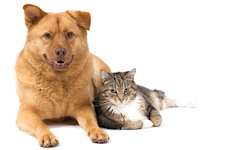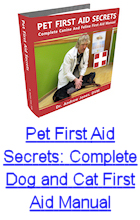|
 Hello Friend, Hello Friend,
A Good Morning to you and your significant others this snowy Thursday.
This is GREAT for the health of your pets, and the MOST COMPLETE Course on Dog and Cat Holistic Pet Health for Pet Owners.
Here: http://www.veterinarysecretsrevealed.com/course
------------------------------------------------------
Millions of Cats killing Millions of Birds
------------------------------------------------------
The domestic and feral cat population is growing in North America,
and as such there is increasing conflict with those wanting to stop
the killing of wild birds.
Some of the more ignorant members of the public suggest things like
mass cat euthanasia, while more thoughtful others are suggesting a
variety of balanced solutions.
Here is an abstract from a recent research paper:
IMPACTS OF FREE-RANGING DOMESTIC CATS (FELIS CATUS) ON BIRDS IN THE UNITED STATES: A REVIEW OF RECENT RESEARCH WITH CONSERVATION AND MANAGEMENT RECOMMENDATIONS
NICO DAUPHINÉ1 AND ROBERT J. COOPER
Abstract. American birds face an estimated 117 to 157 million
exotic predators in the form of free-ranging domestic cats (Felis
catus), which are estimated to kill at least one billion birds
every year in the United States.
Cats have contributed to declines and extinctions of birds
worldwide and are one of the most important drivers of global bird
extinctions. In this paper, we review recent scientifi c research
on the impacts of free-ranging cats on birds, with an emphasis on
threats to migratory landbirds in the United States.
Studies have shown that cats pose threats to many bird populations,
including priority species for conservation, through their
predation of adult, nestling, and juvenile birds. Cats also have
impacts on birds through competition with native predators such as
raptors, and through the harboring and transmission of zoonotic and
other diseases to birds and other wildlife.
In addition to direct mortality, cats may also cause stress
responses in birds due to predation risk that may result in bird
population declines.
A substantial increase in public outreach is urgently needed to
educate citizens about the conservation and welfare problems caused
and faced by outdoor cats. Effective cat and wildlife management in
this context will also require strengthening and enforcing policies
and laws that control outdoor cats, many of which are already in place.
--------------------------------------
Select Recommendations:
--------------------------------------
Develop links from PIF ( Partners in Flight) pages to existing
sites, such as websites of the ABC Cats Indoors! campaign and
American Association of Wildlife Veterinarians, and to position statements from a dozen professional organizations on the issue of cat predation at: http://www.tnrrealitycheck.com/positions.asp;
• Consider cat predation as an International
Migratory Bird Day theme;
• Help ABC promote their Cats Indoors!
program through PIF educational outlets;
• Develop a plan to direct messages to
certain groups—bird educators, law
enforcement agents, animal control agencies,
humane societies, pet products
companies. PetSmart and PETCO support
TNR programs, but also sell wild
bird products such as bird seed. Pressure
these companies to either stop their support
of TNR, or stop selling bird seed;
• Work specifically with pet industry companies
to deliver clear messages regarding
proper pet care and not in any way
supporting feral cat colonies. This will
be challenging because they sell products
(e.g. pet/cat doors and radio collars
for cats) that encourage the public not
to be responsible or delude the owners
regarding safety;
• Develop public service announcements,
possibly from the U.S. Fish and Wildlife
Service (USFWS), regarding free-ranging
cats and feral cat colonies
• Support, enact, develop, and enforce
leash laws and spay and neuter programs
for cats. Work to eliminate feral
cat colonies;
• Make sure that USFWS law enforcement,
and State wildlife law enforcement
offi cials know about egregious violations,
especially of cat colonies in or
near Ecological Services critical habitat,
Important Bird Areas (IBAs), breeding
bird concentration areas, etc.;
• Look for additional alliances to address
issues of anthropogenic causes of mortality,
such as: pet food industries, animal
control agencies, humane societies,
city and county governments, state and
federal agencies, non-profi t organizations,
professional and conservation
organizations, and academia;
• Volunteer to humanely trap and remove
cats where no public service to do so is
available, in accordance with the wishes
of property owners and managers and
relevant laws. Some businesses or institutions
(e.g. campuses) might be eager
to humanely remove feral cats from
their premises, but may lack appropriate
information or resources to do so;
/////////////////////////////////////////////////////////////////
P.S. Do your part- IF your cat is a hunter, then consider bells,
etc, and turning him/her into an indoor cat.
I like cats AND birds, as I suspect most of you cat owners out there
do as well.

P.P.S. For those of you wanting to be MORE involved with your pet's
health care, HERE is THE At Home Home Study Course giving you simple
and quick STEPS to a healthier dog or cat.
It comes with HUNDREDS of testimonials.
http://www.veterinarysecretsrevealed.com/course
Heal Your Pets At Home!
Best Wishes,
Dr Andrew Jones

DISCLAIMER: This information is for educational purposes only and is not intended to replace the advice of your own veterinarian. Dr Andrew Jones resigned from the College of Veterinarians of B.C. effective December 1 2010, meaning he cannot answer specific questions about your pet's medical issues or make specific medical recommendations for your pet.
PRIVACY POLICY: We will never rent, sell, loan, provide, barter, exchange or in any way make available your personal information to others. You can unsubscribe or change your email address at any time using the links at the bottom of this email.
Copyright 2010 Four Paws Online Ltd.
Tel: 1-800-396-1534
Fax: 1-888-398-1378
www.veterinarysecretsrevealed.com
support@veterinarysecretsrevealed.com
|